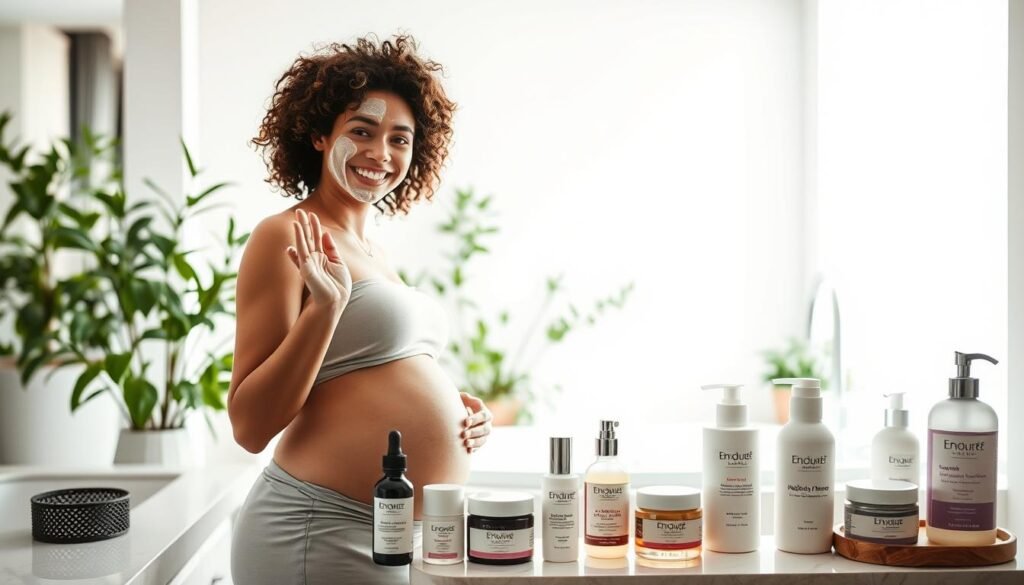Caring for Your Skin During Pregnancy: A Guide

When you find out you’re expecting, everything changes. This includes your skincare routine too!
Your skin goes through many changes during pregnancy. It’s important to change your skincare habits for a healthy and glowing complexion. You might feel more sensitive, dry, or notice hyperpigmentation. So, it’s key to use a pregnancy-safe skincare routine.
Don’t worry, we’ve got you covered! This guide will show you how to adjust your skincare for this special time. You’ll feel more confident on your journey.
Key Takeaways
- Understand the changes your skin undergoes during pregnancy
- Learn how to adjust your skincare routine for a healthy glow
- Discover pregnancy-safe products and ingredients
- Find out how to address common skin concerns during pregnancy
- Get tips on maintaining a consistent skincare regimen
Why Your Skin Changes During Pregnancy
During pregnancy, your skin might change a lot. It’s important to know why this happens to keep your skin healthy. Hormones, changes in your heart, and immune system play a big role.
“Pregnancy brings big changes in hormones, affecting your skin,” says Dr. Jane Smith, a dermatologist. “Some women see better skin, while others face new problems.”
Hormonal Influences on Skin Health
Hormones like estrogen and progesterone cause skin changes. These changes can make your skin produce more oil, leading to acne. But, some women might find their skin gets drier.
Common Skin Conditions Expecting Mothers Face
Women expecting a baby can get acne, darker skin spots, and stretch marks. Knowing about these can help you feel more confident during this time.
- Acne: Hormonal shifts, stress, and more oil can cause it.
- Hyperpigmentation: Hormones can make skin darker in some spots.
- Stretch marks: Fast skin stretching from weight gain leads to these.
Choosing the right pregnancy skincare products and sticking to a natural skincare during pregnancy routine can help. It’s about finding what works best for your skin.
By understanding your skin’s changes during pregnancy, you can take care of it. This way, you can keep your skin healthy and glowing throughout your journey.
Essential Ingredients to Look For in Pregnancy Skincare
Exploring pregnancy skincare can be a game-changer. Knowing the key ingredients is essential. Look for products that are safe and good for your skin.
Safe Hydrating Agents
Keeping your skin hydrated is vital, more so during pregnancy. Hyaluronic acid is a top pick. It locks in moisture, smoothing out wrinkles. It’s perfect for keeping your skin moist and wrinkle-free.
Glycerin is another great hydrator. It pulls in and holds moisture, making it gentle and effective for all skin types.
Natural Oils and Their Benefits
Natural oils are a must-have for pregnancy skincare. They nourish and hydrate, keeping your skin soft and healthy. Some top oils include:
- Coconut oil: It’s full of antioxidants and fatty acids, moisturizing and protecting your skin.
- Jojoba oil: It’s absorbed quickly, balancing your skin’s moisture without clogging pores.
- Argan oil: Rich in vitamin E and fatty acids, it hydrates and calms your skin.
Here’s a quick look at these oils:
| Oil | Key Benefits | Skin Type |
|---|---|---|
| Coconut Oil | Moisturizes, rich in antioxidants | Normal to Dry |
| Jojoba Oil | Balances moisture, easily absorbed | All skin types |
| Argan Oil | Hydrates, soothes | Dry, Sensitive |

Adding these ingredients to your routine can keep your skin glowing during pregnancy. Always check the ingredients and choose products that are safe for pregnant women.
Ingredients to Avoid During Pregnancy
When you’re pregnant, picking the right skincare is key. You need to know what to avoid as much as what to use. Your skin and your baby’s health depend on it.
Harmful Chemicals to Watch Out For
Some chemicals in skincare can be risky during pregnancy. It’s important to avoid:
- Retinoids: These are vitamin A derivatives in anti-aging products. They can harm the fetus.
- Hydroquinone: A skin-lightener that can get into your blood. It might harm your baby.
- Formaldehyde: A preservative in some products. It’s a known cancer-causing agent.
- Phthalates: These chemicals can mess with your hormones. They’re in fragrances and personal care items.
- Chemical Sunscreens: Ingredients like oxybenzone and avobenzone can act like estrogen. This might affect your baby.
Safe Alternatives to Harsh Products
But don’t worry, there are safer options. For example:
- Instead of retinoids, try plant-based retinol alternatives or products with peptides and hyaluronic acid.
- For lightening, use natural ingredients like licorice extract or vitamin C.
- Look for natural preservatives like grapefruit seed extract or potassium sorbate.
- Choose phthalate-free fragrances or go fragrance-free.
- Use mineral sunscreens with zinc oxide or titanium dioxide. They’re safe for pregnant women.
By choosing safer skincare, you can keep your skin and your baby healthy during pregnancy.
Building a Pregnancy-Friendly Skincare Routine
Creating a skincare routine for pregnancy is key to keeping your skin healthy and glowing. Your skin changes a lot during pregnancy, so it needs extra care. This helps it stay healthy and strong.
Morning Routine Essentials
Starting your day with a good skincare routine boosts your confidence. Begin by gently cleansing your face with a mild cleanser that fits your skin type. This removes overnight dirt without drying out your skin.
Next, apply a moisturizer that’s full of natural ingredients and safe for pregnant women. Moisturizing keeps your skin hydrated and soft. It also reduces fine lines and keeps your skin looking good.
Lastly, use a mineral sunscreen with at least SPF 30. Sun protection is very important during pregnancy. It prevents dark spots and protects your skin from harmful UV rays.
| Product | Purpose | Key Ingredients |
|---|---|---|
| Gentle Cleanser | Remove impurities | Glycerin, Ceramide |
| Moisturizer | Hydrate and nourish | Hyaluronic Acid, Vitamin E |
| Mineral Sunscreen | Protect against UV rays | Zinc Oxide, Titanium Dioxide |
Evening Routine Considerations
In the evening, your skincare routine should focus on repair and nourishment. Start by cleansing your face again to remove dirt, makeup, and pollutants from the day.
Then, use a toner to balance your skin’s pH and get it ready for other products. Follow with a night cream or serum that’s full of antioxidants and safe for pregnancy.
Remember, your evening routine is all about giving your skin the care it needs to repair and rejuvenate while you sleep.

Dealing with Acne During Pregnancy
Hormonal changes during pregnancy can lead to acne. But, there are safe ways to manage it. You’re not alone in this struggle, and with the right approach, you can minimize acne’s impact on your skin.
Causes of Pregnancy Acne
During pregnancy, your body undergoes significant hormonal fluctuations. These changes can cause your oil glands to produce more sebum. This leads to clogged pores and acne. Understanding the cause is the first step to managing it effectively.
Effective and Safe Treatment Options
When treating acne during pregnancy, it’s important to choose safe products. Azelaic acid, glycolic acid, and benzoyl peroxide are safe and effective. Azelaic acid reduces inflammation, while glycolic acid exfoliates the skin. Benzoyl peroxide kills bacteria that cause acne.
Maintaining a pregnancy safe skincare routine is vital. This includes gentle cleansing and using non-comedogenic products. Avoid harsh chemicals. A natural skincare approach during pregnancy helps manage acne and supports overall skin health.
Managing Stretch Marks
Being pregnant is exciting, and stretch marks are a normal part of it. There are ways to manage them. As your belly grows, your skin stretches, leading to stretch marks. You’re not alone in this concern!
Preventive Measures to Consider
To prevent stretch marks, keep your skin hydrated and supple. A good moisturizing cream can help a lot. Look for creams with coconut oil, shea butter, and vitamin E for their nourishing benefits.
Here are some tips to consider:
- Moisturize your skin daily, focusing on areas prone to stretch marks like your belly, breasts, and thighs.
- Stay hydrated by drinking plenty of water throughout the day.
- Maintain a healthy diet rich in vitamins and minerals that support skin health.
Products for Reducing Appearance
If you already have stretch marks, there are products to help. Look for ones with retinol, peptides, or hyaluronic acid. These can improve skin texture and elasticity.
| Product | Key Ingredients | Benefits |
|---|---|---|
| Stretch Mark Cream by Mama Mio | Coconut Oil, Shea Butter, Vitamin E | Hydrates and nourishes the skin, reducing the appearance of stretch marks. |
| Belly Firm Cream by Bio-Oil | Peptides, Hyaluronic Acid | Improves skin elasticity and firmness, minimizing stretch marks. |
| Stretch Marks Serum by Palmer’s | Retinol, Vitamin C | Enhances skin texture and reduces the visibility of stretch marks. |
While stretch marks are common in pregnancy, you can take steps to reduce them. Use the right skincare products and live a healthy lifestyle. This way, you can feel more confident during your pregnancy.
Sun Protection for Pregnant Women
Pregnancy changes your skin in many ways. It’s important to protect it from the sun. Your skin is more sensitive, so sun protection is key.
During pregnancy, your skin changes due to hormones. Protecting it from the sun is vital. Sun exposure can cause hyperpigmentation and worsen melasma, a common issue for pregnant women.
The Role of SPF
SPF measures how well sunscreen blocks UVB rays, which cause sunburn. Using a broad-spectrum sunscreen with high SPF is important for pregnant women to protect against UVA and UVB rays.
Mineral-based sunscreens are best for pregnant women. They contain zinc oxide or titanium dioxide. These ingredients block UV rays, making them safe and effective.
Recommended Sunscreen Products
Choose sunscreens labeled as “non-comedogenic” or “hypoallergenic” to avoid skin irritation. Look for products with zinc oxide or titanium dioxide.
Here are some tips for using sunscreen during pregnancy:
- Apply sunscreen 15-30 minutes before going outside.
- Reapply every two hours or after swimming or sweating.
- Use sunscreen with protective clothing and seek shade.
By focusing on sun protection and choosing the right sunscreen, you can enjoy the sun safely during pregnancy.
Hydration and Its Impact on Skin
Drinking enough water and eating hydrating foods can make your skin healthier during pregnancy. As your body changes, staying hydrated is key for skin elasticity and health.
Importance of Drinking Water
Drinking water is a simple yet effective way to keep your skin healthy. It helps flush out toxins and keeps your skin hydrated from the inside out. During pregnancy, aim for 8-10 glasses of water a day to support your skin’s health and elasticity.
Staying well-hydrated can also help reduce fine lines and wrinkles. This makes your skin look more radiant and healthy. It’s a habit that benefits not just your skin, but your overall health as well.
Hydrating Foods for Healthy Skin
Adding hydrating foods to your diet can also support your skin’s health. Foods like watermelon, cucumbers, and strawberries are not only refreshing but also packed with nutrients.
- Watermelon is rich in vitamin C and lycopene, antioxidants that help protect your skin from damage.
- Cucumbers are known for their cooling effect and high water content, making them perfect for hydrating snacks.
- Strawberries are packed with vitamin C, which is key for collagen production and maintaining skin elasticity.
Eating these foods can help keep your skin’s moisture barrier strong. This supports its overall health and appearance during pregnancy.

Seeking Professional Advice
Your pregnancy skincare routine might need expert advice. This is because your skin changes a lot during this time. What works for others might not work for you.
When to Consult a Dermatologist
If you have ongoing skin problems like severe acne or unusual rashes, see a dermatologist. They can suggest safe treatments and help manage any pregnancy-related skin issues.
Also, if you’re not sure about the safety of certain skincare products, a dermatologist can help. They can guide you through the complex world of pregnancy skincare. This ensures you use safe and effective products for you and your baby.
Importance of Personalized Recommendations
Personalized skincare advice is very important during pregnancy. A dermatologist can look at your skin type and medical history. They will give you a skincare plan that’s just right for you.
Here are some benefits of getting professional advice:
| Benefit | Description |
|---|---|
| Customized Skincare | A dermatologist can create a skincare plan that addresses your specific concerns and skin type. |
| Safe Product Guidance | They can recommend products that are safe to use during pregnancy, helping you avoid harmful ingredients. |
| Effective Treatment Options | For issues like acne or hyperpigmentation, a dermatologist can suggest effective treatments that are safe for pregnant women. |
By getting professional advice, you can have a healthier, more radiant complexion during your pregnancy. Don’t hesitate to contact a dermatologist if you have skincare concerns or if your skin is causing you trouble.
Real-Life Skincare Success Stories During Pregnancy
Many expecting mothers have found ways to keep their skin healthy during pregnancy. Their success stories are inspiring. By using a pregnancy safe skincare routine, they maintained their glow.
Lessons from Experienced Moms
Experienced mothers advise on a simple, consistent skincare routine. They recommend gentle products without harsh chemicals. Keeping the skin hydrated is key to its health.
By following these tips, many women have tackled common pregnancy skin issues. Issues like acne and stretch marks are lessened. Their experiences show the value of informed skincare during pregnancy.
FAQ
Q: What is a safe skincare routine during pregnancy?
Q: Are there specific skincare products that are safe for pregnant women?
Q: What ingredients should I avoid in skincare products during pregnancy?
Q: How can I manage acne during pregnancy?
Q: Can I prevent stretch marks during pregnancy?
Q: What kind of sunscreen is safe to use during pregnancy?
Q: How important is hydration for skin health during pregnancy?
Q: When should I consult a dermatologist during pregnancy?
Q: Are there any natural skincare routines that are beneficial during pregnancy?
Also read: Practical Mental Health Advice for Moms






